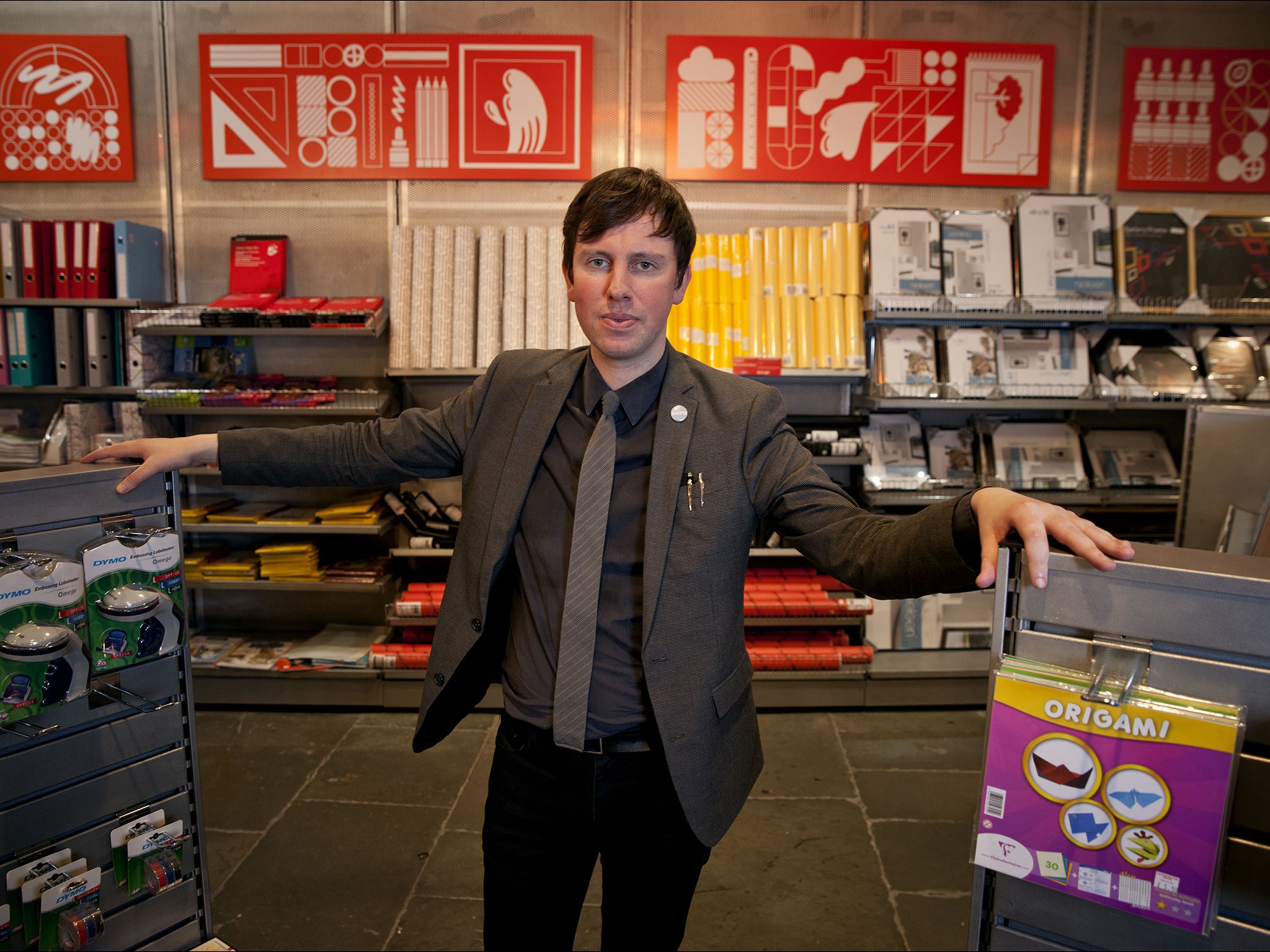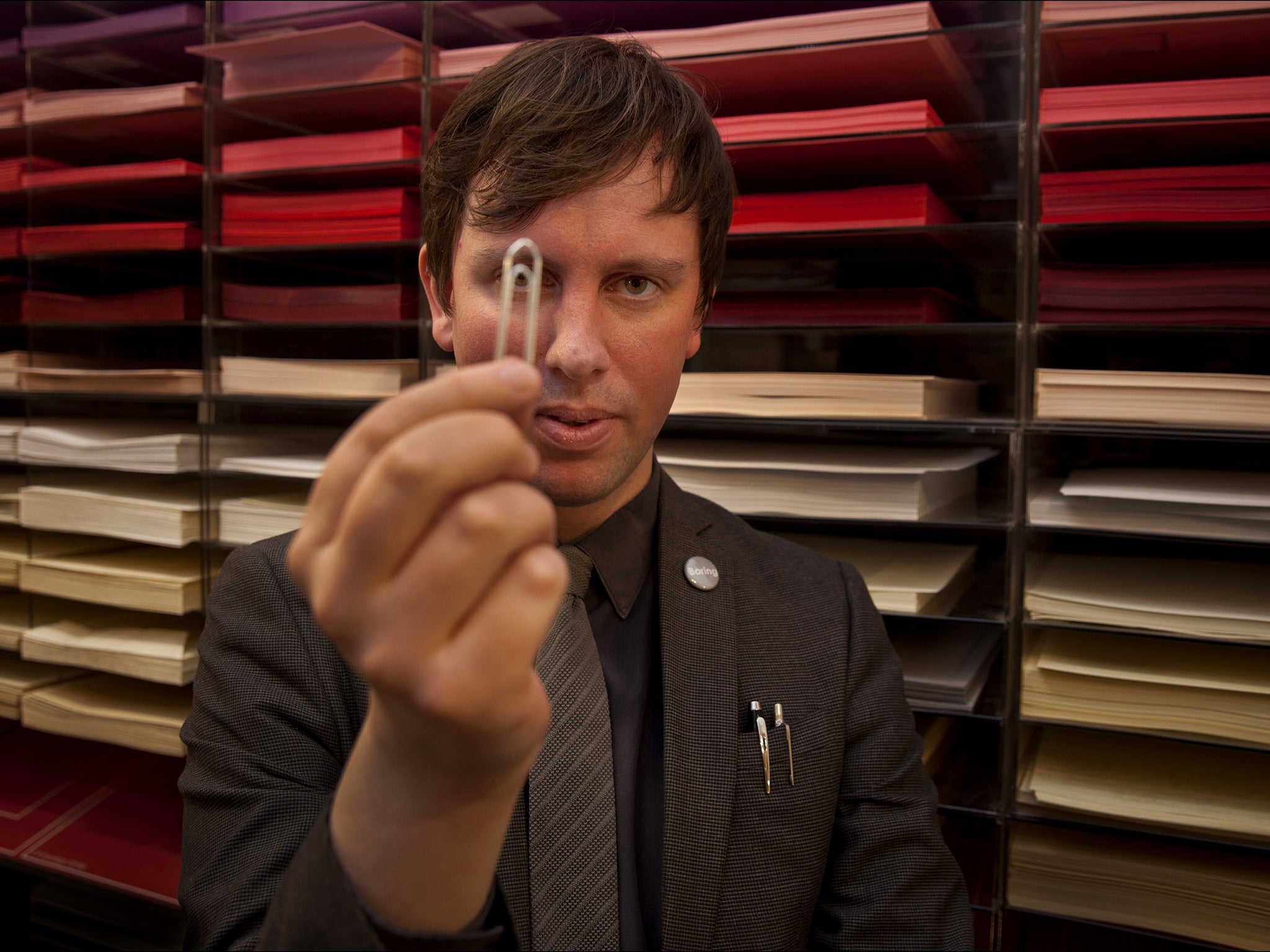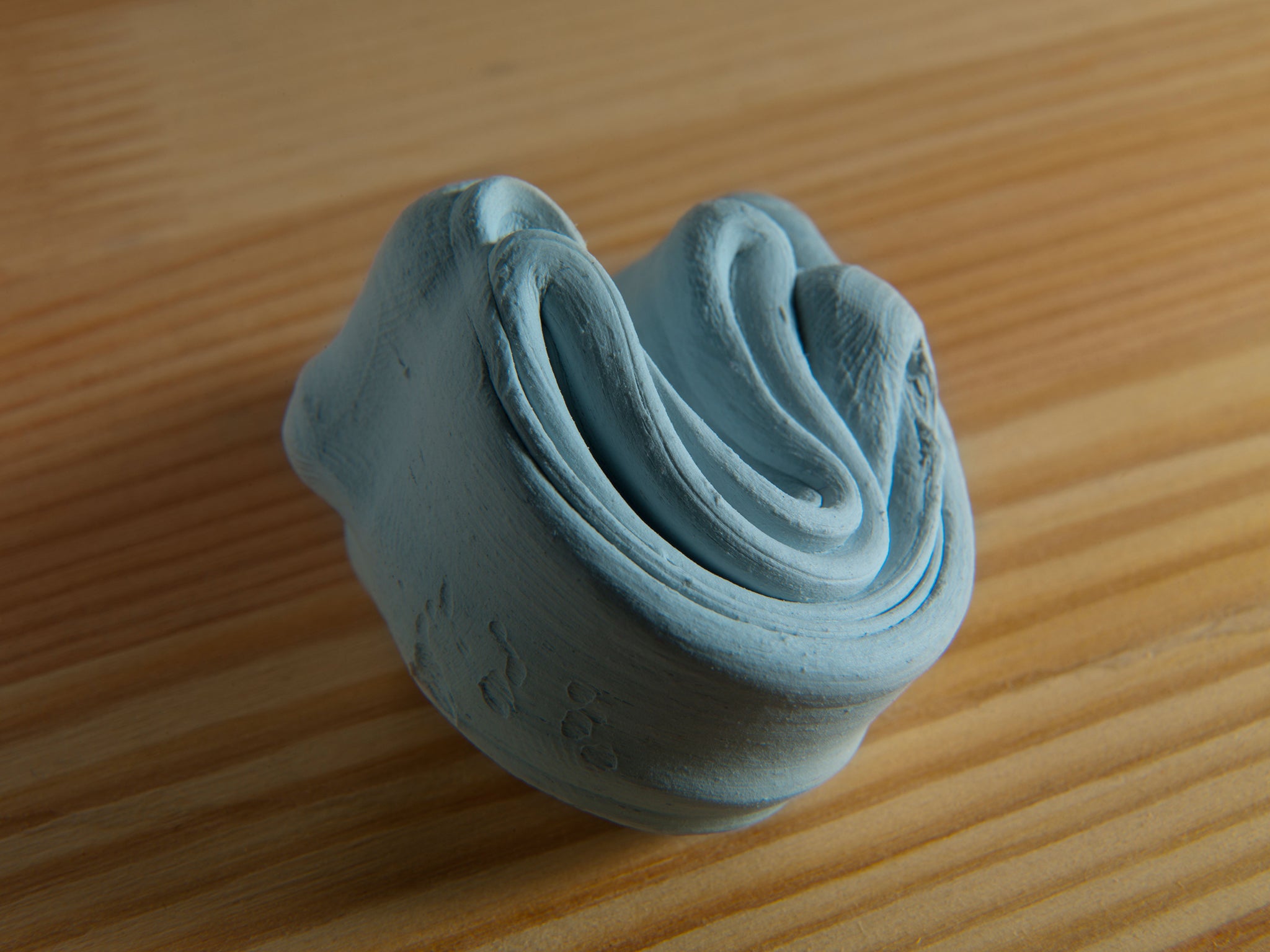Adventures In Stationery: Author James Ward loves Post-it notes, paper clips and staplers so much he has written a whole book about them
It may be humble but, like all objects, stationery has a story and Ward's first book tells it with an understated flair. Rhodri Marsden gets down to brass tacks with him

Your support helps us to tell the story
From reproductive rights to climate change to Big Tech, The Independent is on the ground when the story is developing. Whether it's investigating the financials of Elon Musk's pro-Trump PAC or producing our latest documentary, 'The A Word', which shines a light on the American women fighting for reproductive rights, we know how important it is to parse out the facts from the messaging.
At such a critical moment in US history, we need reporters on the ground. Your donation allows us to keep sending journalists to speak to both sides of the story.
The Independent is trusted by Americans across the entire political spectrum. And unlike many other quality news outlets, we choose not to lock Americans out of our reporting and analysis with paywalls. We believe quality journalism should be available to everyone, paid for by those who can afford it.
Your support makes all the difference."A few years ago, Tipp-Ex changed the applicator in its bottles of correction fluid from a brush to a kind of sponge tab," says James Ward, authoritatively, picking up a bottle from a nearby shelf. "A good thing?" I ask, hesitantly.
"Well, yes," Ward replies. "The brush used to go all crusty and hard, didn't it, and spike off in different directions. The tab made operation more precise." He's not wrong. I remember from school the pleasure associated with opening a new bottle of Tipp-Ex after having binned one because the old brush had become more of a nuisance than an administrative aid. But I suppose that I'd never really thought about it. In fact, I'd never spent much time considering stationery at all. From the Biro to the set square, from the pencil to the Post-it note, stationery was merely a passive player in the art of creativity or the act of learning. Humble, modest, true, stationery never demanded any attention. But like all objects, stationery has a story. And Ward, in his first book, Adventures In Stationery, tells it with an understated flair.
Browsing the Covent Garden branch of London Graphic Centre, a haven of neatness and order, with sufficient pens, paper and pencils to give your average stationery buff an adrenaline rush, I ask Ward if he's drawn towards any item in particular. "Well, the selection of office supplies here is quite poor, because this place is more about art," he says, pointing at one shelf. "I've found that I've become quite particular about this stuff. There's a stationery brand called Q-Connect who produced some paperclips mis-labelled "parerclips", and it made me have less faith in them. I doubted the quality control process. But I bought them anyway, in case they ended up being valuable – you know, like an old British stamp where the Queen's head is facing the wrong way." I start giggling, but Ward's expression is deadpan. Throughout our lunch hour together, I find his slightly mundane observations hilarious, but often I'm not sure why – or indeed whether there is a joke, and if so, whether it's on me, or on him.
This seems to be Ward's unique selling point. He is mainly known for being the founder and host of the annual Boring Conference, a celebration of "the ordinary, the obvious and the overlooked" that has attracted such notable speakers as Adam Curtis, Robin Ince, Jon Ronson and Josie Long, examining subjects as varied as sneezing, toast, IBM tills and the sounds made by vending machines. In the meantime, he has maintained a blog named after Warhol's famous quote, "I Like Boring Things", where his interests are probed in excruciating detail; relentless repetition goes hand in hand with an almost obnoxious obsession with minutiae, e.g. how many free pens Argos produces each year. Somehow, and I'm not sure how, it succeeds in being funny, charming and far more interesting than expected.
"There are people who are football obsessives," he says, "who can name teams going back years and remember what minute such-and-such a goal was scored. They're considered normal guys who like their football. And there are people who memorise endless Beatles facts, you know, who played what instrument on which album and so on, and that's also deemed cool. But if you apply that same interest to something like stationery, you're mocked, despite the motivation and impulse being exactly the same. We're only supposed to be interested in the big things that most people like, while the things we all deal with on a day-to-day basis are, for some reason, not meant to be given any thought. But someone, somewhere, has to know about that stuff. Otherwise nothing would ever get done."

In 2010, Ward and fellow stationery enthusiast Ed Ross launched Stationery Club, a regular and wholly unironic pub meet-up for anyone who loved stationery. And yes, people showed up. "I think that the internet has allowed these supposedly 'boring' people to find each other," Ward says. "At work, my colleagues might notice that I bring in my own stationery rather than use the stationery in the office, but they probably wouldn't try to engage me in conversation about it. Online, it's completely different." At Stationery Club, a transatlantic Skype interview with the man who invented the Post-it note might be interspersed with pints of lager and a comparison of fibre-tipped pens.
The club demonstrated that while most people evidently walk past a branch of Ryman without a second thought, a significant minority experience something of a thrill as they walk through its doors, down the aisles and past the box files. "Without wishing to overstate it," says Ward, aware that he's overstating it, "stationery has created civilisation. Language is how we make sense of the world, and written language gives us an aggregated sense of knowledge. That only happens because of stationery." I point out that this has more to do with pens than, say, desk tidies. "Well, yes, I suppose there are less essential items," he says. "But if you've got pens, you need to put them somewhere, don't you? You can't just have them rolling around."
If we accept this noble purpose for stationery, that doesn't quite explain the fetish that many people evidently have for it. Perhaps these everyday objects are reassuring, introducing as they do a kind of order in a chaotic world. Perhaps they're aspirational. After all, they facilitate creativity and progress; the purchase of a Moleskine notebook represents a small first step towards writing a novel, or planning a round-the-world trip. And they're certainly tools of procrastination. "When you want to get organised," says Ward, "the first thing you do is come into a shop like this and buy all the stuff that helps you get organised. It's a way of assuaging your guilt over your own inactivity. It makes you feel like you've done something, when all you've actually done is buy a pack of Post-it notes."

"But there's also inherent beauty in this stuff," he adds. "A simplicity of design, a pristine quality. When you buy a new pack of Blu-Tack and open it, there's that perfect blue slab, and it's a rare moment because one pack of Blu-Tack generally lasts ages. But once the first lump has been pulled off, one stretched corner that you have to fold back in on itself, it's not the same.
"So, in the same way as you have toy collectors who buy one toy to play with and an identical one to keep in its box, I'm the same with Blu-Tack. Buy one to use, and one to admire." I'm laughing, but once again, I have a suspicion that Ward may be serious.
His book certainly is serious, while frequently frivolous; it's a fascinating history of some of our most beloved items of stationery, including drawing pins, highlighter pens and staples. It dispels the myths about the role of the ballpoint pen in the Space Race and queries the "thousands of uses" claimed by the aforementioned Blu-Tack on its packaging. "There's a timeless quality to a lot of stationery," says Ward, "something like the paper clip, or the pencil. There have been tweaks along the way, but these things provide a connection between the ages."
But what about today's paperless office? Ward harrumphs slightly. "It doesn't exist, does it? However paperless your office is, you've still got paper. And the act of writing things down will always be important. It stores information more deeply in your mind than if you just press a button."
Ward's preoccupations and interests aren't for everyone, of course. Many view his and others' interest in a subject such as stationery as indicative of some kind of dysfunction, a fact that he readily acknowledges while also questioning the integrity of their reasoning. "I've had three types of interviews while organising the Boring Conference," he says. "There are the people who buy into it and understand this idea of focusing on the overlooked. Then there are the people who think 'Hey! Let's get this wacky guy on to talk about his wacky interests!' and I usually fail to fulfil their expectations. But then there are the ones who just want to take the piss out of me. I did one radio interview where the guy was particularly obnoxious, saying things like 'What? And you've got a girlfriend? Seriously?' And to me that's just a kind of lazy thinking. It's forming the most superficial reaction to something without interrogating any further."

You could argue that Ward, in his grey suit and his lapel badge with the word "Boring" on it in a particularly dull font, is almost asking for it. "To be honest, I'm kind of past worrying about what people think," he says. "I guess what I've done – rather cleverly, if I say so myself – is to pre-empt the accusation of being boring by using that word a lot. So if people do call me boring, I can say 'Well, yes, exactly,' and not worry about having any feelings about it." But what if your book is described as "boring" when it's reviewed? Did you find yourself reining in the minutiae in order to appeal to a wider public?
"I did spend a lot of time writing detailed sections about the patents of various types of stapler," he says, "but it was quite therapeutic to go back through it, literally with a red pen, cross out huge sections that didn't need to be there and make it interesting. The aim of everything I do is not to be boring, it's to point out that things are more interesting than they appear at first glance."
The publication of the book almost marks the recognition of Ward's "slow information" movement by the establishment; while his other projects have all been self-financed, a publisher came on board for Adventures In Stationery, and in doing so has somehow validated the subject. An interest in stationery need no longer be embarrassing.
"There's a stationery trade show in London every year," says Ward. "It's industry only, but in the past I've always just sneaked in. They don't really expect people to be interested, so they don't check credentials. I just register online, make up a company name and a job title and go along. Wander around. Pick up some free samples, check out what's happening. But now I guess I'm part of the stationery establishment. I've moved from amateur to professional…" he pauses for a second, shifting nervously and emitting a muffled laugh. "Professional… whatever this is." Dullard? Nah. Entertainer? Might be pushing it. Beguiling storyteller? Definitely.
James Ward's book, 'Adventures In Stationery – A Journey Through Your Pencil Case' is published by Profile Books on 11 September
Join our commenting forum
Join thought-provoking conversations, follow other Independent readers and see their replies
Comments